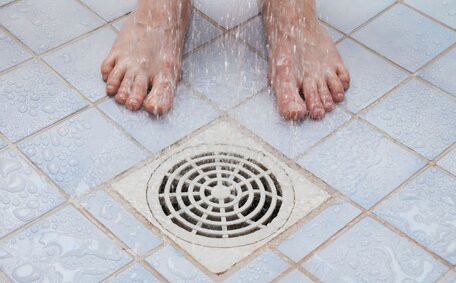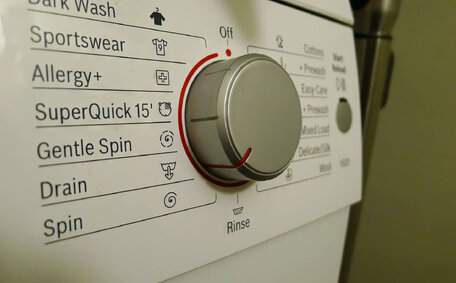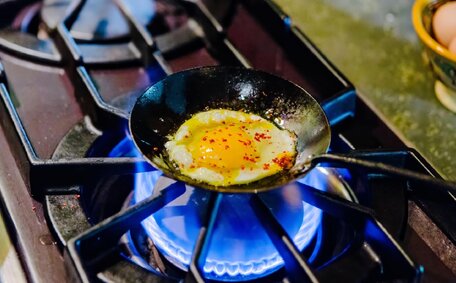
Baking Soda & Vinegar for Cleaning
Using baking soda & vinegar separately for cleaning is very effective; but mixing them dilutes their cleaning power. Learn how to use them properly.
Read MoreProper drain maintenance is crucial for preventing clogs, backups, and damage in plumbing systems. Over time, drains will slow down and can eventually become blocked. This leads to messy overflows, foul odours, and expensive repairs.
Many homeowners are unaware that putting the wrong substances down sinks and drains can lead to major issues. When items like fats, oils, grease, and solids build up, they stick to pipe walls and restrict water flow.
Pouring certain liquids like chemicals, paints, and automotive fluids down drains is also extremely hazardous. These substances not only eat away at pipes, but also contaminate water supplies and the environment when they leach into the ground or waterways. Even items that seem harmless like coffee grounds or eggshells can accumulate and cause obstructions.
Being mindful of what goes down drains is the key to preventing problems and keeping plumbing systems operating smoothly. Being mindful of what goes down drains is the key to preventing problems and keeping plumbing systems operating smoothly.
Proper disposal and regular drain maintenance are also vital. A bit of knowledge goes a long way in preventing headaches down the line.
There are many common household items that homeowners inadvertently pour down drains, causing nasty clogs. Being aware of the most likely culprits is key to avoid plumbing disasters.
Fats, Oils and Grease
Cooking oils, grease, butter, margarine, and food scraps are some of the biggest drain offenders. When washed down sinks, grease sticks to pipe interiors. As more grease accumulates over time, it traps food particles and other debris, eventually hardening into blockages.
Hair
Showers and bathroom sinks easily accumulate strands of hair. The slimy texture allows hair to stick to pipes and itself, forming dense wads. Excess hair in drains slows water flow considerably.
Food
Leftover scraps and bits rinsed off dishes can build up. Items like rice, pasta, oatmeal, and coffee grounds are common culprits. Though small, they collect in drains and cause obstructions.
Dental Floss
It’s tempting to wash floss down the sink after use. However, its stringy texture wraps around pipe joints and traps other debris, creating a tangled mess.
Paper Products
Paper towels, tissues, napkins, and even toilet paper can accumulate in drains. When wet, they turn into a thick pulpy substance that sticks to pipes.
Avoid pouring any of these problematic substances down sinks and drains. Proper disposal in the trash or compost is essential for clear pipes.
Grease and cooking oils are some of the worst offenders when it comes to clogging drains and damaging plumbing systems.
As grease cools, it solidifies and sticks to the insides of pipes. Even small amounts that are rinsed down the sink will leave a coating. Over time, this greasy film accumulates and causes major blockages.
Hot oils like those used for deep frying are particularly problematic. When poured down drains, the high heat melts plastics and can warp pipe interiors. Grease clings to these damages and catches food particles, accelerating clogs.
Fatty, oily substances are also difficult for small residential plumbing and sewer systems to break down. Rather than dissolving, grease sticks to pipe walls throughout the system. The gradual build-up restricts water flow and requires costly cleaning.
All cooking oils, meat fats, lard, shortening, butter, margarine and seasonings containing these should never be washed down the sink. Allow fats to cool and solidify before disposing of them in the rubbish bin. Using strainers in sinks to catch food scraps is also recommended to keep drains clear.
Many homeowners believe that small food particles like coffee grounds, rice, and vegetable scraps can be rinsed down the drain with no issues. However, even tiny food debris can accumulate inside pipes and eventually lead to clogged drains.
Coffee grounds may seem harmless, but their gritty texture means they do not dissolve fully. Over time, they collect along pipe walls and snag other particles like fats and grease. Piled up grounds then form a dense sludge that blocks drains.
Starchy foods like rice, pasta, and oatmeal can also stick together inside pipes. As water washes more of these down, they glom together into obstructions. Fruit and vegetable peels and skins may get caught in pipe joints.
It is best to refrain from putting any food waste down drains, no matter how small. It is best to refrain from putting any food waste down drains, no matter how small.
Using sink strainers can help catch debris when washing dishes. Maintaining clear pipes will prevent costly plumbing issues.
Hair is one of the most common causes of clogged drains and slow drainage, especially in bathroom sinks and showers. The slimy texture of hair allows strands to easily stick to pipe interiors and other debris already present. Over time, large, dense wads of hair accumulate in drains and severely restrict water flow.
Excess hair in drains initially leads to gurgling sounds and water backing up. Eventually, it can cause complete blockages and foul odours if left unaddressed. Hairs washed down the sink after brushing or showering are usually the main culprits.
To prevent hair build-up in drains, it’s advisable to install drain screens. Avoid letting clippings from haircuts go down the drain. To prevent hair build-up in drains, it’s advisable to install drain screens.
These removable filters catch loose strands and make it easy to dispose of hair properly in the trash.
Chemical drain cleaners containing enzymes or microbes can also help break down hair and keep drains clear. For severe obstructions, call a professional plumber for drain cleaning services. Getting clogs cleared before they worsen prevents extensive plumbing repairs.
p>p>p>p>p>p>p>p>p>p>p>p>
Proper bathroom drain maintenance is crucial for preventing clogs and backups. There are certain best practises homeowners should follow.
DO:
DON’T:
Following these dos and don'ts will keep bathroom drains free of obstructions. Take steps to prevent build-up before it leads to slow drainage or backups. A clog-free drain reduces the chance of messy overflows and expensive plumbing repairs.
When it comes to keeping drains clear, proper disposal of debris and waste is crucial. Certain items like fats, oils, grease, and food particles should never be washed down the sink. Here are the best methods for getting rid of these common drain cloggers:
Fats, Oils and Grease
All cooking oils, meat fats, butter, shortenings, and oily dressings should be poured into a heat-safe container after use. Allow to fully cool and harden before tossing the whole mass into the rubbish bin. Thoroughly wipe down oily pans and dishes with paper towels before washing to keep grease out of drains.
Food Scraps
Remove all food particles from plates and cookware using rubber scrapers and paper towels prior to washing. Avoid sending any debris down the drain. Place food scraps like eggshells, coffee grounds, and vegetable peels into compost bins or directly into the garden as fertiliser. For meat and leftover scraps, discard in the garbage.
Hair
Use drain catchers and screens in shower and sink drains to trap loose hair before it washes away. Remove built-up hair and dispose of it in the rubbish bin regularly. After brushing or grooming, gather any loose hairs and toss them in the trash rather than rinsing them down the drain.
Making a habit of proper disposal, and keeping harmful substances out of drains completely, will prevent backups, overflows, and damage to plumbing systems.
Preventing clogged drains and maintaining healthy plumbing is essential for every home. A bit of diligence goes a long way when it comes to avoiding major pipe obstructions down the line.
First and foremost, be conscious of what is washed down drains on a daily basis. Avoid pouring fats, oils, grease, food scraps and other debris listed in this article down sinks. These substances cling to pipe interiors and accumulate over time, eventually hardening into blockages.
Proper disposal in the trash or compost is vital.
Use drain catchers and filters in sinks and showers to prevent loose hair and particles entering the drainage system. These should be cleaned out regularly before build-up occurs. Pouring a liquid drain cleaner weekly will also help clear soap scum and material stuck in pipes.
For regular maintenance, use a drain snake or auger monthly to remove any debris or hair collected in drains that catchers miss. Chemical enzyme cleaners and microbe treatments can break down organic matter and keep pipes free flowing.
Keep an eye out for any gurgling sounds, slow drainage or foul odours, as these indicate a potential clog forming. Take steps to clear drains as soon as any issues appear. Waiting until complete blockages occur leads to backups and overflows requiring costly repairs.
A bit of vigilance goes a long way when it comes to clog prevention. Proper habits make sure plumbing systems operate smoothly for years before any major problems arise.
Most minor plumbing issues like clogged drains or leaky faucets can be managed with basic DIY methods. However, certain problems are signs that a professional plumber needs to be called in for the required expertise.
Seeking professional help is recommended if any of the following occur:
While the average handyperson can handle minor clogs or leaks, extensive obstructions, burst pipes, and other complex issues require professional equipment and expertise.
Mistakes by inexperienced persons can worsen problems and cause expensive damages. It is wise to call in a licenced plumber from a reputable company like Lilyfield Plumbing. They can accurately identify issues and resolve them with the right solutions.
Do not delay at the first signs of serious plumbing troubles. Early intervention can minimise the extent of the damage. Their licenced plumbers are available 24/7 for all repair needs.
For the highest quality service in Sydney, contact the team at Lilyfield Plumbing on [Phone Number] or [email].
Using baking soda & vinegar separately for cleaning is very effective; but mixing them dilutes their cleaning power. Learn how to use them properly.
Read MoreBlocked drains are usually caused by buildup of hair, grease, debris and more in your pipes. Fix the problem with professional drain unblocking services to get your drains flowing freely again. Contact us for affordable drain unblocking.
Read MoreWhen you suspect a gas leak or damaged gas line, contact a licensed gas fitter immediately to locate and repair it. A gas line repair involves sealing leaks, replacing corroded or damaged pipes and testing all connections for safety before restoring gas supply.
Read MoreLilyfield, 2040 NSW
We will call back as soon as possible.




